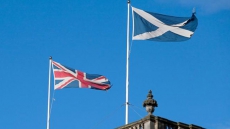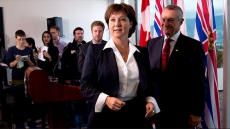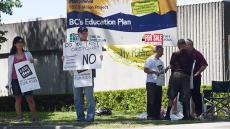Results of a provincewide vote were announced late Thursday, with 86 per cent of the 31,741 teachers who cast ballots voting in favour of the agreement.
B.C. Teachers' Federation president Jim Iker announced the result means teachers across the province will lower their picket lines and open schools as early as Monday, but stated they will not do anything to make up the lost time.
"This was a very tough round of negotiations and a difficult time for many of us on strike. But together, we successfully pushed back against concessions and we have emerged as a stronger and more engaged union," Iker told reporters and some 40,000 observers over a live-streamed news conference.
He said terms that came from a six-day marathon bargaining session that ended in the wee hours of Tuesday morning were not possible at any other point over the last three months.
"We all know that this deal isn't perfect, but it does provide gains for teachers. It protects our Charter Rights and increases support for our students."
Education Minister Peter Fassbender released a statement after the results congratulating the union.
"We have one of the best public education systems in the world, and that's in large part because we have such great teachers," he wrote. "We can now focus on the path forward."
The result is lower than the landslide support garnered in another vote last week to end the dispute with binding arbitration, and ranks third among four other ratification votes over the past decade.
Iker said the union knows it didn't get everything needed to improve B.C.'s education system, but said members had spoken and described the outcome as a "strong vote of support."

The six-year deal includes a 7.25 per cent salary increase, improvements in extended health benefits and the teaching-on-call rates, as well as a $400-million education fund to hire specialist teachers. It provides an additional $105 million for dispatching of retroactive grievances.
The settlement is the lengthiest ever reached, expiring on June 20, 2019.
The dispute dragged out for months, ending the last school year two weeks early and delaying the start of the new one by three weeks.
With enormous public pressure to get school underway, specific details of the agreement were hastily presented in meetings across the province just ahead of the vote. Many teachers felt there were few wins.
"I don't like this agreement," said Robin Holburn, a music teacher at Prince of Wales Secondary in Vancouver, following a packed gathering at the Queen Elizabeth Theatre.
"Our negotiating team did the very best it could, I believe ... but this is not a good deal for B.C. students and it's not a good deal for B.C. teachers."
While receiving applause from thousands of teachers, the panel of union negotiators bluntly admitted that some provisions of the deal were "not nearly enough."
Most importantly, class size and composition — the issue at the centre of a 12-year dispute between teachers and the provincial government — remain the same.
The provincial government has lost two B.C. Supreme Court cases over its 2002 decision to unilaterally remove class size and composition from the collective agreement. The government is appealing and a hearing is scheduled next month.
In Vancouver, teachers were told the meeting was not the proper venue for their personal anger.
There remained as many questions as there were answers as teachers tried to find out things like whether they will make up lost time from the strike and whether per-student funding improved.
Posters were taped up on walls and telephone poles along the streets around the Vancouver theatre imploring the city's 4,300 teachers to vote against the deal.
"I'd rather work-to-rule than sign a contract with the devil," said one homemade sign. "Vote No with a clear conscience and wipe that smirk off Christy's face."
Although the Yes vote surpassed the threshold, it's among the lowest shows of support in a litany of strike and ratification votes over several decades.
A vote in 2006 to accept a five-year collective agreement, months after teachers staged an illegal two-week strike, passed by 93.4 per cent with a total of 25,129 educators casting ballots. Some 88 per cent were in favour in 2005 and only 75 per cent in 2012.
The vote to commence the present-day, full-scale strike was heralded by the union last June for its highest turnout ever, when 86 per cent of 33,387 members who went to the polls.
The teachers' last contract expired in June 2013.
Ratification means teachers will enter classrooms on Friday to prepare for the new school year. Individual school boards will decide whether classes begin on Monday or Tuesday.
Ebru Montagano, a Grade 4-5 teacher at Bayview Elementary School in Vancouver, said her vote was to return to her students.
"It's not perfect, but it's good enough for now," she said.
That sentiment was echoed again and again.
"I think it's the best we're going to get," said Teresa Brown.





